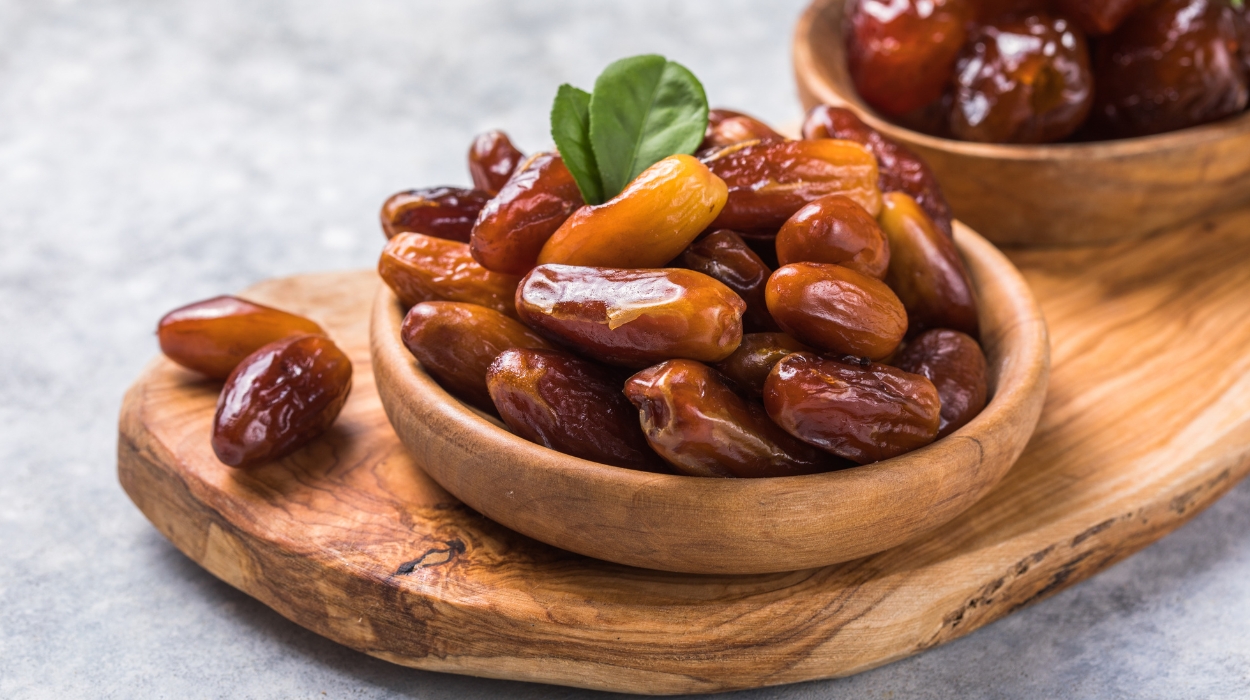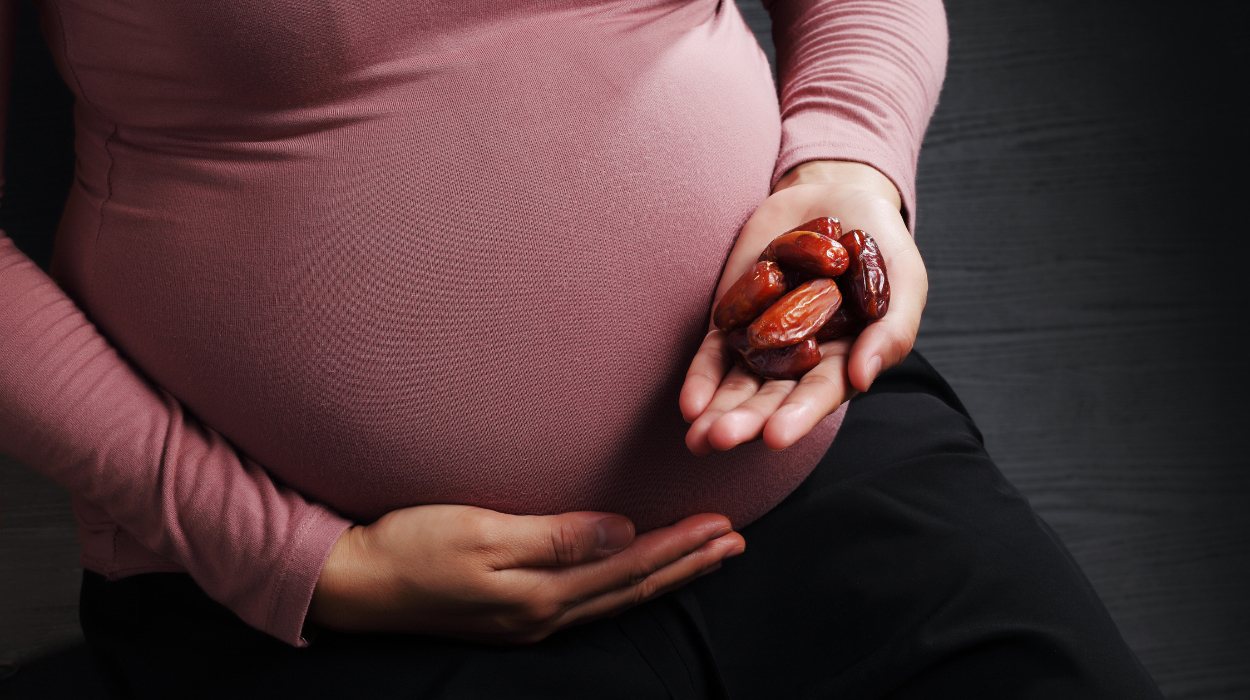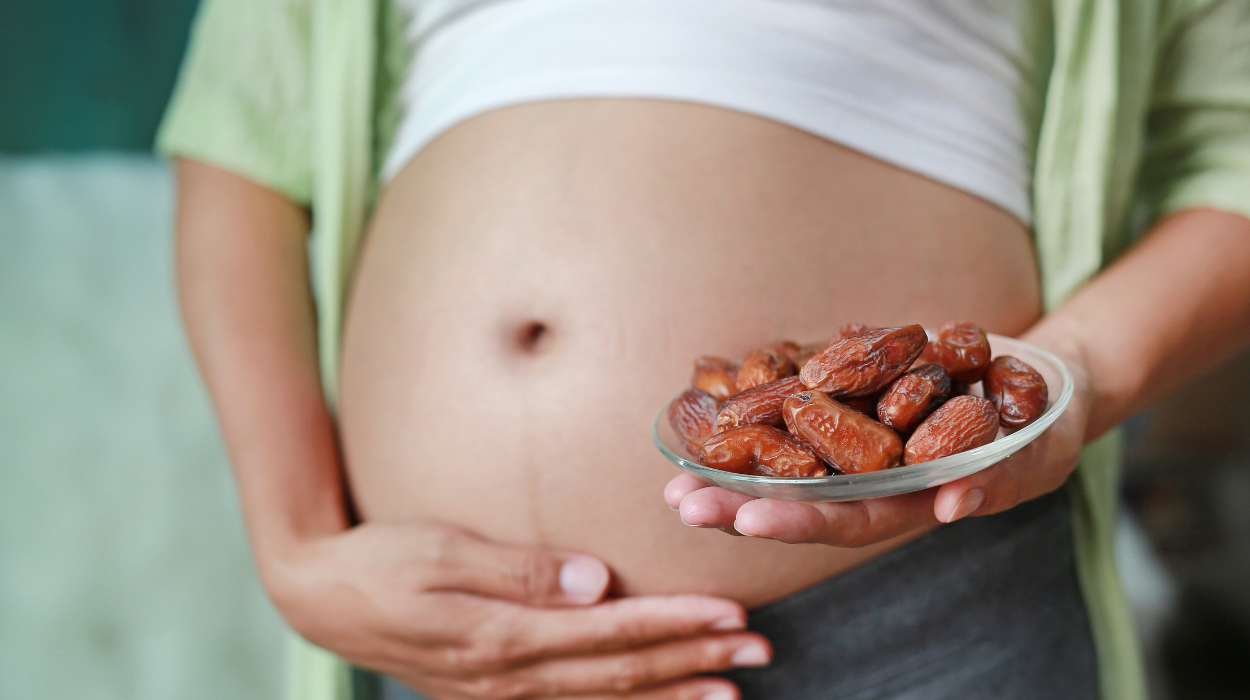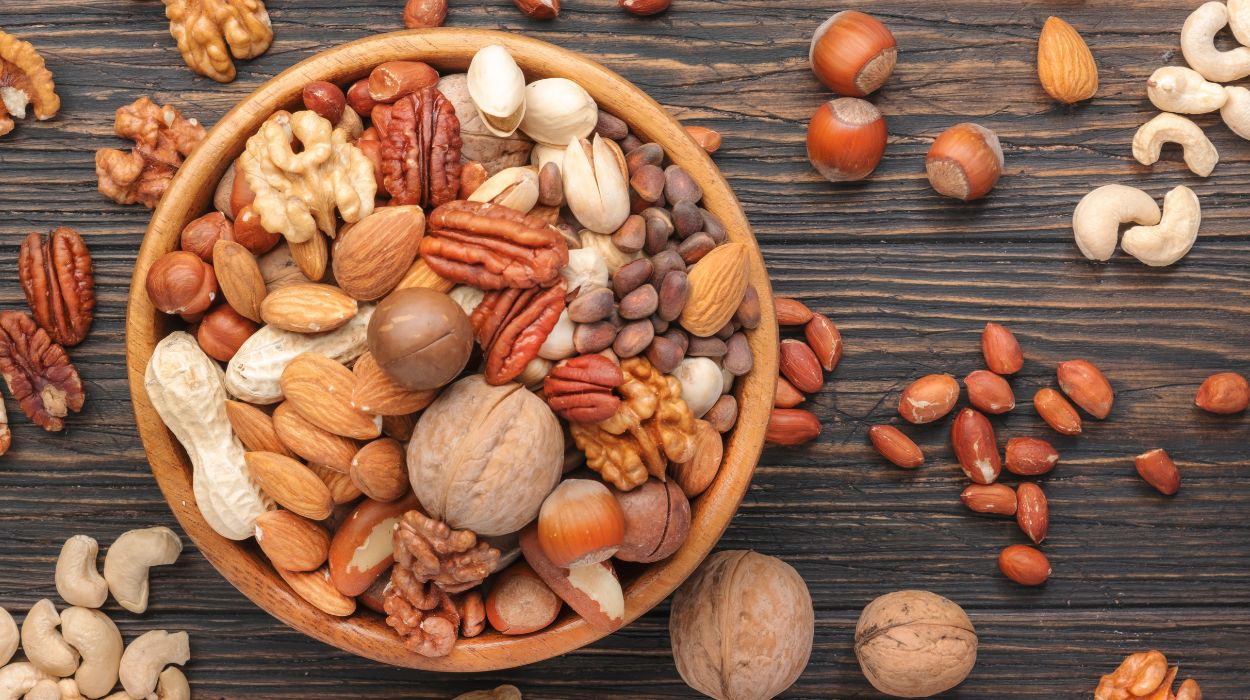Eating Dates During Pregnancy In 2024: Ultimate Guide For Mothers

Diet is important during pregnancy because the foods you eat affect your baby’s development. It’s essential to follow a diet that provides you with the nutrients you need to support the pregnancy. It’s also important to consider how your diet affects your own health.
Healthy fruits and vegetables can be a central part of a healthy pregnancy diet[1] because they’re packed with nutrients. More specifically, eating dates during pregnancy can come with benefits. Dates aren’t only nutritious; they can also support a smooth labor and delivery process.[2]
Below, learn about the benefits of the date fruit for pregnant women. You’ll learn how to incorporate them into a pregnancy diet, as well as safety considerations.
What Are The Benefits Of Dates During Pregnancy?
When you’re pregnant, it’s important to consider how your diet affects your health and that of your growing baby. Date fruit consumption can come with some of the following benefits:
- Provision of essential minerals.
- Calories to meet energy demands.
- Improved digestion.
- Management of sugar cravings.
- Increased likelihood of spontaneous labor.
- Reduced duration of labor.
- Decreased risk of neural tube defects.
- Lower risk of postpartum hemorrhage.
Benefits Of Eating Dates During Pregnancy

The date fruit provides numerous nutritional benefits and is an excellent source of magnesium and potassium.[3] Dates are healthy in general, but they can be particularly beneficial for pregnant women.
Dates during pregnancy can come with unique benefits, given their effects on the labor and delivery process. These and other benefits of dates are discussed below.
Provision Of Essential Minerals
As indicated above, dates are an excellent source of minerals, including magnesium. This is beneficial for pregnant women because magnesium might reduce the risk of pre-eclampsia.[4] Some studies show conflicting results; nonetheless, magnesium[5] is essential for the health of mother and baby.
Potassium intake is also important during pregnancy, but over half[6] of pregnant women have inadequate intake. Consumption of date fruit can help pregnant women meet their potassium requirements.
Calories To Meet Energy Demands
In many cases, it’s important to avoid excess calorie consumption, as this can lead to weight gain. However, a woman needs additional calories during the later stages of pregnancy. Calorie needs[1] increase by about 340 calories per day during the second trimester and 450 calories per day during the third trimester.
Dates are calorie-dense and can be beneficial for women struggling to keep up with the energy demands of pregnancy. A 100-gram serving of Medjool dates contains 277 calories.[7] Dates also contain fast-absorbing carbs,[3] so they are a quick source of energy.
Based on their nutritional composition, dates can even help you manage pregnancy fatigue.
Improved Digestion
Constipation[8] is common during pregnancy, but consuming date fruit can help. A 100-gram serving of dates contains nearly 7 grams of fiber,[7] making them beneficial for digestive health.
Intake[9] of dietary fiber is associated with a reduced risk of constipation. So, pregnant women who struggle with constipation may benefit from adding dates to their diets.
Management Of Sugar Cravings
Pregnancy cravings[10] are common, with sweets being one of the most commonly-craved foods. If you’re trying to maintain a healthy diet, dates can help you manage a sweet tooth.
Dates are naturally sweet and are a good alternative to candies and sweet treats. Unlike processed sweets, the date palm fruit is high in fiber[3] and packed with nutrients. Consume dates regularly to take care of sugar cravings naturally.
Increased Likelihood of Spontaneous Labor
You might be less likely to need medical intervention to induce labor if you consume dates during pregnancy. A review of 48 different studies found that date consumption[2] in late pregnancy reduced the need for labor induction.
Date fruits contribute to spontaneous labor because they enhance cervical ripening. This indicates how prepared the cervix is for labor, and it is determined based on the Bishop score.[11] A high Bishop score means the cervix is ripe and ready for labor.
Late pregnancy date consumption is associated with a higher Bishop score[2] upon admission for labor. Women who consume dates also have increased cervical dilation upon admission, which increases the chances of spontaneous delivery.[12]
Reduced Duration Of Labor
Most women probably don’t want labor to last for hours and hours on end. The good news is that date eaters tend to have a shorter labor duration as well.
Research has shown that date consumption[2] in late pregnancy reduces the length of labor. Most research supports that dates can shorten labor in the first stage. Some studies suggest dates could also reduce the length of the second stage[13] of labor.
Decreased Risk Of Neural Tube Defects
Beyond their other nutritional benefits, dates contain folic acid,[14] which is important for pregnancy. Folic acid prevents the development of neural tube defects[15] in the baby. These defects lead to problems in the brain and spinal cord and can cause disabilities like spina bifida.
Pregnant women who add dates to their diet increase their intake of folic acid. This can be critical for healthy fetal development.
Lower Risk Of Postpartum Hemorrhage
Another benefit of dates for pregnant women is that they may reduce the risk of postpartum hemorrhage. In one study, a group of women was given 100 grams of date fruit two hours after delivery.
Compared to women who didn’t eat dates, those consuming dates after birth had reduced amounts of hemorrhage.[16]
What Do Dates Do For Pregnancy?
Dates have numerous health benefits during pregnancy. For example, they are rich in magnesium and potassium,[3] both essential for pregnancy. Dates are also an excellent source of dietary fiber, so they can contribute to improved digestion for pregnant women.
Beyond their nutritional benefits, dates can promote a healthy labor and delivery process. Date consumption[2] in the last weeks of pregnancy can reduce the likelihood a woman will need medical inducement of labor. It can also prepare the cervix[2] for labor and shorten labor duration.[13]
You might be wondering, “How do dates help with labor?” Dates provide benefits for labor and delivery because of their physiological effects on the body.
Dates are rich in fatty acids involved in the production of compounds called prostaglandins.[14] These compounds contribute to cervical ripening and uterine contractions, thus promoting smoother, faster labor.
Finally, dates can improve outcomes for mothers and babies. They might reduce the risk of postpartum hemorrhage[16] in the mother. In addition, they provide folic acid to reduce the risk of neural tube defects[15] in the baby.
Are Dates Safe During Pregnancy?

There is nothing inherently unsafe about eating dates during pregnancy. In fact, date fruits have numerous health benefits. However, they can be high in calories and sugar.[7]
If you have experienced excessive gestational weight gain, it’s important to be mindful of the calories in dates. Furthermore, if you develop gestational diabetes, it’s important to track your intake of dates. They are high in carbs and sugar,[7] and you don’t want to go overboard.
As long as you don’t have a medical reason to avoid dates, they can be safely incorporated into a prenatal diet. Be sure to consume them in moderation and be mindful of portion sizes, as you would with any food.
Of course, if you have an allergy to date fruits, they should be avoided. Signs of an allergic reaction[17] include hives, flushing or rash, tingling or itching in the mouth, and dizziness. You might also experience swelling in the tongue or face, difficulty breathing, and stomach cramping.
Considerations For Women With Diabetes
Since dates contain a significant amount of natural sugars; people may worry that they will increase blood sugar levels. However, dates have not been shown to increase blood glucose in studies with people with type 2 diabetes.[18] Nonetheless, check with your doctor to be sure that dates are safe for you.
The bottom line is that you should be able to consume dates in moderation, even if you have gestational diabetes. Consult with your doctor or dietitian if you’re concerned about the sugar content in your diet.
How Many Dates To Eat During Pregnancy?
To enjoy the health benefits of dates, you can consume them in moderation throughout pregnancy. Follow the recommended serving size on the package of dates.
If you’re looking for information on how many dates to consume in the final weeks of pregnancy, research provides some guidelines. For example, in one study,[19] women consumed seven dates daily starting at 38 weeks gestation. They had improved cervical ripening and shorter labor duration compared to women not consuming dates.
Keep in mind that the serving size can vary based on the type of date. If you’re consuming a larger variety, you may not need as many dates to achieve the same benefits. Check the product label to determine the proper serving size.
When Should I Start Eating Dates During Pregnancy?
You can enjoy dates throughout your pregnancy to manage sugar cravings and provide your body with the nutrition it needs. However, if you’re looking to prepare for labor, consuming dates during the last few weeks of pregnancy is important.
A clinical trial that evaluated the effects of date consumption in late pregnancy[19] began at 38 weeks gestation. One group did not eat any dates, and the other ate dates each day for the last two weeks of pregnancy. Women consuming dates had increased cervical ripeness, and their labor was shorter in duration.
Another study found date consumption[20] reduced the duration of labor when women began eating them at week 37 of pregnancy. This study provides additional insights into when to start eating dates in pregnancy.
Based on these studies, you should start consuming dates two to three weeks before your estimated due date. This is the case if you’re consuming dates for labor benefits. However, you can consume them in early pregnancy to enjoy their many nutritional benefits.
How To Eat Dates During Pregnancy
There are several ways to enjoy date fruit during pregnancy. You can buy pitted dates at most grocery stores. Enjoy them on their own for a sweet snack or a nutritious dessert.
You can also blend dates into a smoothie to enjoy added nutritional benefits. Or, you can mix them with yogurt or oatmeal for a healthy breakfast. Some people even use dates in recipes for baked goods, such as muffins.
If you want to make dates into a paste, you can blend them in a food processor to make jam. Use it to top toast or pancakes or as a healthy sweetener. This is an easy way to get more servings of fruit.
Conclusion
Late pregnancy consumption of dates can shorten labor[19] and prepare the cervix for childbirth. In addition, including them as part of a regular pregnancy diet will help you to manage a sweet tooth. Dates are also an excellent source of nutrition, which supports a healthy pregnancy.
Just be sure not to eat too many dates. While the date fruit is healthy, it is high in calories and carbohydrates. Eating this food in excess could lead to high-calorie intake and excessive weight gain. However, enjoyed in moderation, dates are quite healthy for pregnancy
Frequently Asked Questions
Dates contribute to shorter labor[2] and decreased need for medical induction of labor. This is because they enhance cervical ripening. They also contribute to uterine contractions by playing a role in the production of prostaglandins.[14]
There are several types of dates, including Medjool and noor dates. They have similar nutritional composition,[21] but the size of the fruit, and thus the serving size, can vary. Both varieties should soften the cervix with proper serving size.
You can safely eat dates at any time during pregnancy. However, if you have an allergy or medical reason to avoid them, you shouldn’t eat them. Eating dates in late pregnancy can shorten labor.[2]
Dates are safe to eat at any point during pregnancy unless you have an allergic reaction or medical reason to avoid them.
Hormonal changes[10] can lead to cravings early in pregnancy. This can cause you to feel hungrier than usual.
+ 21 Sources
Health Canal avoids using tertiary references. We have strict sourcing guidelines and rely on peer-reviewed studies, academic researches from medical associations and institutions. To ensure the accuracy of articles in Health Canal, you can read more about the editorial process here
- Health.gov. (2023). Eat Healthy During Pregnancy: Quick tips – MyHealthfinder | health.gov. [online] Available at: https://health.gov/myhealthfinder/pregnancy/nutrition-and-physical-activity/eat-healthy-during-pregnancy-quick-tips
- Zahra Salajegheh, Nasiri, M., Masoomeh Imanipour, Zamanifard, M., Sadeghi, O., Mohammad Ghasemi Dehcheshmeh and Asadi, M. (2024). Is oral consumption of dates (Phoenix dactylifera L. fruit) in the peripartum period effective and safe integrative care to facilitate childbirth and improve perinatal outcomes: a comprehensive revised systematic review and dose-response meta-analysis. BMC Pregnancy and Childbirth, [online] 24(1). doi:https://doi.org/10.1186/s12884-023-06196-y.
- Muneera Al-Mssallem, Mustafa, A. and Raga Mohamed Elzaki (2019). Nutritional Security of Date Palm Fruit: An Empirical Analysis for Al-Ahsa Region in Saudi Arabia. [online] ResearchGate. Available at: https://www.researchgate.net/publication/338209954_Nutritional_Security_of_Date_Palm_Fruit_An_Empirical_Analysis_for_Al-Ahsa_Region_in_Saudi_Arabia
- Sonia Santander Ballestín, Isabel, M., Jara Ballestín Ballestín and María José Luesma Bartolomé (2021). Is Supplementation with Micronutrients Still Necessary during Pregnancy? A Review. Nutrients, [online] 13(9), pp.3134–3134. doi:https://doi.org/10.3390/nu13093134.
- Dalton, L.M., Ní, D.M., Gaydadzhieva, G.T., Mazurkiewicz, O.M., Leeson, H. and Wright, C. (2016). Magnesium in pregnancy. Nutrition Reviews, [online] 74(9), pp.549–557. doi:https://doi.org/10.1093/nutrit/nuw018.
- Crawford, S., Brown, A.R., Juliana Teruel Camargo, Kerling, E.H., Carlson, S.E., Gajewski, B.J., Sullivan, D.K. and Valentine, C.J. (2023). Micronutrient Gaps and Supplement Use in a Diverse Cohort of Pregnant Women. Nutrients, [online] 15(14), pp.3228–3228. doi:https://doi.org/10.3390/nu15143228.
- Usda.gov. (2024). FoodData Central. [online] Available at: https://fdc.nal.usda.gov/fdc-app.html#/food-details/168191/nutrients
- Shi, W., Xu, X., Zhang, Y., Guo, S., Wang, J. and Wang, J. (2015). Epidemiology and Risk Factors of Functional Constipation in Pregnant Women. PLOS ONE, [online] 10(7), pp.e0133521–e0133521. doi:https://doi.org/10.1371/journal.pone.0133521.
- Journal of the American College of Nutrition. (2020). Risk Factors for Constipation in Adults: A Cross-Sectional Study. [online] Available at: https://www.tandfonline.com/doi/abs/10.1080/07315724.2020.1727380
- Hill, A., V. Cairnduff and McCance, D.R. (2015). Nutritional and clinical associations of food cravings in pregnancy. Journal of Human Nutrition and Dietetics, [online] 29(3), pp.281–289. doi:https://doi.org/10.1111/jhn.12333.
- Khalifa, M.A., Abbas, A.M., Gaber, M.A. and Salah, M. (2018). Bishop score versus transvaginal ultrasonographic measurement of cervical length in predicting successful… [online] ResearchGate. Available at: https://www.researchgate.net/publication/328524557_Bishop_score_versus_transvaginal_ultrasonographic_measurement_of_cervical_length_in_predicting_successful_labor_induction_in_post-term_pregnancy_prospective_cohort_study?enrichId=rgreq-b5825b645ac8a77efdfb53b61a99c1e5-XXX&enrichSource=Y292ZXJQYWdlOzMyODUyNDU1NztBUzo2ODU4MzQzMjM5MTQ3NTNAMTU0MDUyNzA1Mzg0OA%3D%3D&el=1_x_2&_esc=publicationCoverPdf
- Ragnhild Gjærum, Ingvild Haarklau Johansen, Pål Øian, Stine Bernitz and Dalbye, R. (2022). Associations between cervical dilatation on admission and mode of delivery, a cohort study of Norwegian nulliparous women. Sexual & Reproductive Healthcare, [online] 31, pp.100691–100691. doi:https://doi.org/10.1016/j.srhc.2021.100691.
- Nasiri, M., Zeinab Gheibi, Miri, A., Rahmani, J., Asadi, M., Sadeghi, O., Maleki, V. and Mahmoud Khodadost (2019). Effects of consuming date fruits (Phoenix dactylifera Linn) on gestation, labor, and delivery: An updated systematic review and meta-analysis of clinical trials. Complementary Therapies in Medicine, [online] 45, pp.71–84. doi:https://doi.org/10.1016/j.ctim.2019.05.017.
- Alireza Bagherzadeh Karimi, Elmi, A., Mojgan Mirghafourvand and Roghaiyeh Baghervand Navid (2020). Effects of date fruit (Phoenix dactylifera L.) on labor and delivery outcomes: a systematic review and meta-analysis. BMC Pregnancy and Childbirth, [online] 20(1). doi:https://doi.org/10.1186/s12884-020-02915-x.
- Jamanetwork.com. (2024). Available at: https://jamanetwork.com/journals/jama/article-abstract/2596300
- Niknami, M., Farash, M., Rahnavardi, M., Saman Maroufizadeh and Roya Faraji Darkhaneh (2023). The effect of date fruit consumption on early postpartum hemorrhage: a randomized clinical trial. BMC Women’s Health, [online] 23(1). doi:https://doi.org/10.1186/s12905-023-02604-9.
- Center (2023). Food Allergies: What You Need to Know. [online] U.S. Food and Drug Administration. Available at: https://www.fda.gov/food/buy-store-serve-safe-food/food-allergies-what-you-need-know
- Sachdev, M. and Misra, A. (2023). Effect of dates on blood glucose and other metabolic variables: A narrative review. Diabetes & Metabolic Syndrome: Clinical Research and Reviews, [online] 17(2), pp.102705–102705. doi:https://doi.org/10.1016/j.dsx.2023.102705.
- Kariman, N., Maryam, Sang, Rahbar, N., Afrakhteh, M. and Lary, H. (2015). The effect of consumption date fruit on cervical ripening and delivery outcomes. Pajoohandeh Journal, [online] 20(2), pp.72–77. Available at: http://pajoohande.sbmu.ac.ir/browse.php?a_id=1996&sid=1&slc_lang=en
- Masoumeh Kordi, Fatemeh Aghaei Meybodi, Tara, F., Farzaneh Rashidi Fakari, Nemati, M. and Mohammad Taghi Shakeri (2017). Effect of Dates in Late Pregnancy on the Duration of Labor in Nulliparous Women. PubMed, [online] 22(5), pp.383–387. doi:https://doi.org/10.4103/ijnmr.ijnmr_213_15.
- Salomón-Torres, R., Noé Ortiz-Uribe, Benjamín Valdéz-Salas, Navor Rosas-González, Conrado García, Chávez, D., Iván Córdova-Guerrero, Díaz-Rubio, L., Pilar, D., José Luis Mijangos-Montiel, Morales-Maza, A., Mahadevan, P. and Krueger, R.R. (2019). Nutritional assessment, phytochemical composition and antioxidant analysis of the pulp and seed of medjool date grown in Mexico. PeerJ, [online] 7, pp.e6821–e6821. doi:https://doi.org/10.7717/peerj.6821.






